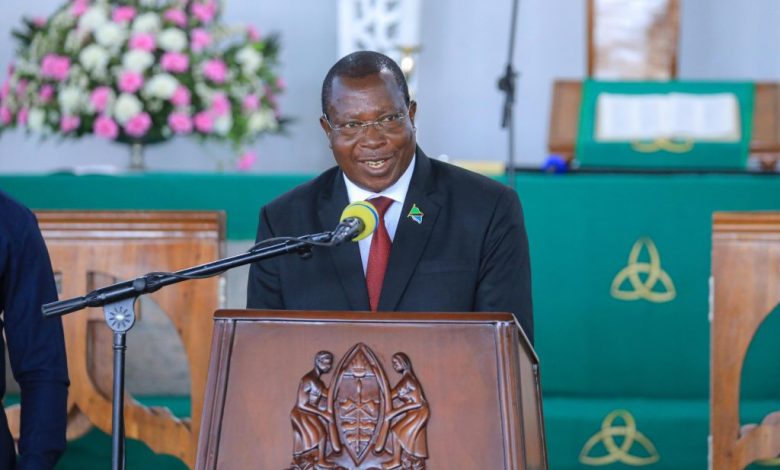Tanzania’s bold climate justice stand tall

THE climate crisis has never been only about rising temperatures, it is equally about justice, responsibility and survival.
This truth was powerfully underscored in Tanzania’s message at the 2nd Africa Climate Summit in Addis Ababa, where Vice-President Dr Philip Mpango laid bare the stark imbalance of a world in which Africa contributes the least to global emissions yet bears the heaviest burden of their consequences.
Across the continent, nations are already reeling from unpredictable rainfall, prolonged droughts, rising sea levels and saltwater intrusion.
These impacts cut deep eroding agriculture, straining health systems and damaging vital infrastructure. These impacts erode economic gains, intensify poverty and demand public spending that could otherwise go to education, health or industrial development.
Dr Mpango noted that Tanzania spends two to three per cent of its GDP annually on climate resilience. That may sound small, but for a developing country it is a significant fiscal sacrifice.
This situation illustrates a larger structural inequality, developing states are compelled to finance adaptation for a crisis disproportionately shaped by industrialised economies, while wealthy nations often delay or dilute the pledges they made under the Paris Agreement.
From an analytical lens, the issue goes beyond money. It is about the credibility of international agreements, the principle of shared responsibility and the moral weight of historical emissions. Tanzania’s appeal exposes the gap between global rhetoric and actual delivery.
ALSO READ: Dar eyes 29tri/- boost via minerals
One of the strongest arguments in Dr Mpango’s speech was the call for adaptation to be prioritised on par with mitigation. Global negotiations often focus heavily on emissions reductions, policies, technologies and targets designed to cut greenhouse gases.
While important, this emphasis risks sidelining adaptation, the urgent need to protect vulnerable countries against climate damage that is already happening. For Tanzania, adaptation is not a distant priority. It is a present necessity.
Rising seas threaten coastal communities, droughts undermine food security and floods destroy infrastructure. By foregrounding adaptation, the country reframes the debate that climate policy cannot only be about preventing future risks but it must also help nations survive current ones.
This framing also gives Africa a stronger negotiating position. It pushes back against narratives that treat developing countries as passive recipients of aid and instead positions them as active shapers of global climate priorities.
While the country’s demands from the international community are sharp, the country is also building its own climate governance frameworks.
Vision 2050 integrates climate resilience and green growth as central development pillars. Policies such as the National Environment Master Plan (2022–2032) and the National Clean Cooking Strategy (2024–2034) reveal an attempt to align national development goals with sustainability imperatives.
The clean cooking strategy, in particular, signals a transformative ambition moving 80 per cent of households to modern energy solutions by 2034.
From an analytical perspective, these commitments do two things. First, they provide the country with moral credibility when calling for global finance, showing that the country is not waiting passively but taking initiative.
The commitments also serve as instruments for domestic transformation, linking climate policy to health outcomes, gender equality and poverty reduction. The challenge remains whether these plans can be fully funded and implemented in a country where fiscal space is already stretched.
This again circles back to the unresolved question of predictable climate finance from developed nations. Energy policy is another area where country’s approach reveals a balancing act. The government is investing in renewables hydropower, solar, wind and geothermal while continuing to rely on natural gas as a transition fuel.
Critics might argue that natural gas locks the country into fossil dependence. Supporters counter that the country cannot leapfrog into a fully renewable system overnight. Natural gas, they argue, is cleaner than coal or heavy fuel oil and provides a reliable bridge as the renewable sector scales up.
ALSO READ: Tanzania, Algeria regulators keen to boost petroleum sub-sector
This pragmatic position reflects a broader African perspective that development cannot be sacrificed at the altar of decarbonisation. Industrialisation requires affordable and reliable energy and if rich nations are serious about Africa going green, then financing and technology transfer must follow.
Tanzania’s focus on the Blue Economy adds another analytical dimension. With its long Indian Ocean coastline and major inland lakes, the country is strategically leveraging its geography.
The Blue Economy Policy in Zanzibar and the Strategic Framework on the mainland aim to harness marine resources for fisheries, tourism and transport while embedding sustainability. By integrating the blue economy into climate policy, Tanzania positions itself as both a custodian of fragile ecosystems and a builder of new industries.
It is a strategy that acknowledges climate vulnerability while seeking to turn it into opportunity. Beyond its borders, Tanzania’s role as chair of the African Group of Negotiators (AGN) is highly significant. This bloc is Africa’s primary bargaining instrument in UN climate talks.
As COP30 approaches in Brazil, Tanzania will play a central role in shaping Africa’s united front. This diplomatic responsibility strengthens Tanzania’s hand but also raises expectations. Dr Mpango’s strong emphasis on climate finance, adaptation and loss and damage suggests that Tanzania sees its leadership as both a duty and an opportunity to hold the Global North accountable while advancing Africa’s shared priorities.
Dr Mpango’s speech can be read as both a technical policy outline and a political intervention. It highlights the politics of climate finance who pays, who benefits and who decides. The country’s climate diplomacy reveals a country caught between ambition and dependency.
On one hand, its Vision 2050, clean energy strategies and blue economy frameworks demonstrate a determination to chart its own sustainable future. On the other hand, the scale of its ambition depends on external financing that remains uncertain.





